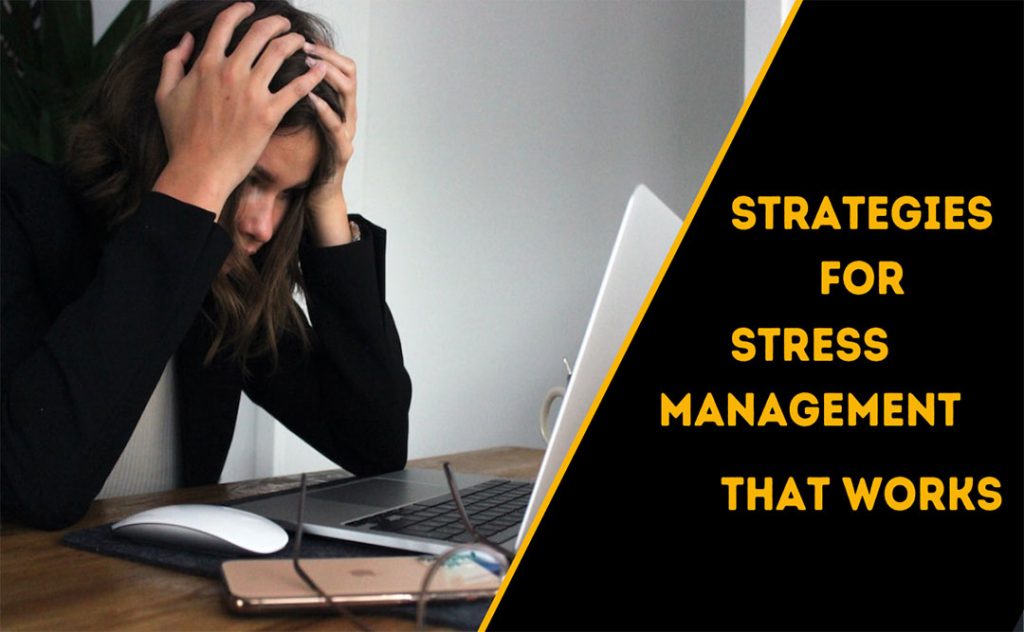Are you feeling overwhelmed and stressed? If so, don’t worry, you’re not alone. Many people feel this way, especially during busy times like the holidays. However, there are strategies for stress management that can help. In this post, we’ll discuss some of the best techniques for reducing stress and improving your mental health. Keep reading to learn more!
Ways to Manage Stress:

- Identify the sources of your stress.
- Develop a plan to change or eliminate the stressful situation.
- Make healthy lifestyle choices.
- Practice stress-reducing techniques.
- Seek professional help when needed.
Identifying the sources of your stress is the first step in managing it. Once you know what’s causing your stress, you can develop a plan to change or eliminate the stressful situation. If you can’t avoid or eliminate the source of your stress, you can still take steps to manage it.
Making healthy lifestyle choices can help you manage stress. Eating a healthy diet, getting regular exercise, and getting enough sleep can all help reduce stress levels.
Practising stress-reducing techniques can also be helpful. Some relaxation techniques that can help manage stress include deep breathing, meditation, and yoga.
If you’re still struggling to manage your stress, seek professional help. A counsellor or therapist can help you develop coping skills and provide support.
There are a variety of ways to manage stress, but not all methods will work for everyone. It’s important to find what works best for you. Experiment with different techniques and make a plan that includes healthy lifestyle choices and stress-reducing activities. Seek professional help if you’re still struggling to manage your stress. With some effort and planning, you can find ways to reduce stress and improve your overall well-being.
Why is stress management so important

Chronic stress can have negative effects on your health, both physically and mentally. It can contribute to problems such as anxiety, depression, insomnia, heart disease, and high blood pressure. That’s why it’s so important to find ways to manage your stress effectively.
There are many different stress management techniques that you can try. Some people find that exercise or relaxation techniques help them to cope with stress, while others find that journaling or talking to a friend can be helpful.
Find what works for you and make sure to practice these stress management techniques on a regular basis. Doing so can help you to feel calmer and in control of your life.
Strategies For Stress Management That Works
Exercise
One of the best ways to manage stress is to get regular exercise. Not only does exercise help to improve your overall health, but it can also help to reduce stress levels.
Exercise releases endorphins, which have mood-boosting effects. It can also help to clear your mind and give you a sense of accomplishment.
Make sure to find an exercise routine that you enjoy and make time for it on a regular basis. Even just 30 minutes of exercise each day can make a big difference in how you feel.
Relaxation Techniques
There are several different relaxation techniques that you can try to help reduce stress. Some people find that deep breathing exercises or yoga are helpful, while others prefer to listen to calming music or take a warm bath.
Experiment with different relaxation techniques and find ones that work well for you. Then, make sure to practice them on a regular basis, especially when you’re feeling stressed.
Journaling
Journaling can be a great way to manage stress. It allows you to get your thoughts and feelings out on paper, which can help to clear your mind and provide clarity.
Writing in a journal can also help you to identify any patterns or triggers that are causing you stress. Once you’re aware of these, you can work on finding ways to avoid them or deal with them in a more constructive way.
Talking to a Friend
If you’re feeling overwhelmed by stress, talking to a friend can be helpful. Just knowing that someone is there to listen and offer support can make a big difference.
Your friends can also offer helpful advice or perspective that you may not have considered. If you’re feeling stuck, talking to a friend can help you to brainstorm solutions and find a way forward.
Get Enough Sleep
It’s important to get enough sleep when you’re dealing with stress. Lack of sleep can make it harder to cope with stress and can also exacerbate mental health problems.
Aim to get 7-8 hours of sleep each night. If you’re having trouble sleeping, there are some things that you can try, such as setting a regular sleep schedule, avoiding screen time before bed, and practicing relaxation techniques.
Eat a Healthy Diet
What you eat can also affect your stress levels. Eating a healthy diet is important for overall health, but it can also help to reduce stress.
Make sure to include plenty of fruits, vegetables, and whole grains in your diet. You should also limit your intake of caffeine, alcohol, and processed foods.
Take a Break
When you’re feeling overwhelmed by stress, it can be helpful to take a break from whatever is causing you stress. This could mean taking a few minutes to yourself to relax or stepping away from a stressful situation.
If you’re able to, take a vacation or even just a few days off from work. This can give you some much-needed time to relax and recharge.
Seek Professional Help
If you’re struggling to cope with stress, it may be helpful to seek professional help. A therapist can provide guidance and support as you work on managing your stress.
If you’re dealing with a lot of stress, you may also want to consider medication. While medication isn’t right for everyone, it can be helpful for some people. Be sure to talk to your doctor about all of your options.
FAQs:
1. What are some effective stress management techniques?
There are a variety of different stress management techniques that can be effective for different people. Some common techniques include exercise, relaxation methods such as deep breathing or meditation, journaling, and time management.
2. What are some tips for reducing stress in daily life?
There are a number of things you can do to reduce stress in your daily life. Some helpful tips include staying organised, setting realistic goals, taking breaks when needed, and communicating with others.
3. What are some signs that someone is experiencing too much stress?
There are a number of different signs that someone may be experiencing too much stress. These can include feeling overwhelmed, experiencing anxiety or panic attacks, having trouble sleeping, and feeling irritable or angry. If you are concerned that you may be experiencing too much stress, it is important to talk to a doctor or mental health professional.
Identify the sources of stress in your life and rank them in order of importance?
Some common sources of stress include work, relationships, finances, and health. It is important to identify the main sources of stress in your life in order to best address them.
5. What are some long-term effects of stress?
If left unchecked, stress can lead to a number of different long-term health problems. These can include heart disease, high blood pressure, diabetes, and depression. It is important to manage stress in order to avoid these potential health problems.
6. What is the best way to deal with stress?
There is no one-size-fits-all answer to this question. Different people will find different stress management techniques to be effective. It is important to experiment with different techniques until you find one that works for you.
7. How can I prevent stress from happening?
There is no sure-fire way to prevent stress from happening, but there are things you can do to reduce your risk. Some helpful tips include maintaining a healthy lifestyle, managing your time wisely, and communicating openly with others.
8. What should I do if I am feeling stressed?
If you are feeling stressed, there are a number of things you can do to help yourself feel better. Some helpful techniques include exercise, relaxation methods such as deep breathing or meditation, and journaling. If you are feeling particularly overwhelmed, it is important to seek help from a doctor or mental health professional.
Conclusion:
The above-mentioned points are some of the many ways in which you can help reduce stress in your life. It is important to find what works for you and to stick with it. Remember, when it comes to stress management, consistency is key. We hope that these tips have helped point you in the right direction and that you will be able to find success with them. What are some of the methods that you use for managing stress? Do you have any Tips For Stress Management That Works? Let us know in the comments below!




